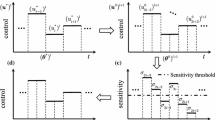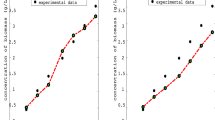Abstract
Dynamic optimization is a very effective way to increase the profitability or productivity of bioprocesses. As an important method of dynamic optimization, the control vector parameterization (CVP) approach needs to select an optimal discretization level to balance the computational cost with the desired solution quality. A new sensitivity-based adaptive refinement method is therefore proposed, by which new time grid points are only inserted where necessary and unnecessary points are eliminated so as to obtain economic and effective discretization grids. Moreover, considering that traditional refinement methods may cost a lot to get the high-quality solutions of some bioprocess problems, whose performance indices are sensitive to some significant time points, an optimization technique is further proposed and embedded into the new sensitivity-based CVP approach to efficiently solve these problems. The proposed methods are applied to two well-known bioprocess optimization problems and the results illustrate their effectiveness.









Similar content being viewed by others
References
Banga JR, Alonso AA, Singh RP (1997) Stochastic dynamic optimization of batch and semicontinuous bioprocesses. Biotechnol Prog 13(3):326–335
Sarkar D, Modak JM (2004) Genetic algorithms with filters for optimal control problems in fed-batch bioreactors. Bioprocess Biosyst Eng 26(5):295–306
Mandal C, Gudi RD, Suraishkumar GK (2005) Multi-objective optimization in aspergillus niger fermentation for selective product enhancement. Bioprocess Biosyst Eng 28(3):149–164
Logist F, Assassa F, Van Impe J, Marquardt W (2012) Exploiting grid adaptation and structure detection in multi-objective dynamic optimization problems. In: Proceedings of the 22nd ESCAPE-European symposium on computer aided process engineering, London, pp 782–786
Telen D, Logist F, Van Derlinden E, Tack I, Van Impe J (2012) Optimal experiment design for dynamic bioprocesses: a multi-objective approach. Chem Eng Sci 78:82–97
Logist F, Telen D, Houska B, Diehl M, Van Impe J (2013) Multi-objective optimal control of dynamic bioprocesses using ACADO toolkit. Bioprocess Biosyst Eng 36(2):151–164
Zhang P, Chen H, Liu X, Zhang Z (2015) An iterative multi-objective particle swarm optimization-based control vector parameterization for state constrained chemical and biochemical engineering problems. Biochem Eng J 103:138–151
Liu P, Li G, Liu X, Zhang Z (2016) Novel non-uniform adaptive grid refinement control parameterization approach for biochemical processes optimization. Biochem Eng J 111:63–74
Luus R (1992) On the application of iterative dynamic programming to singular optimal control problems. IEEE Trans Automat Contr 37(11):1802–1806
Balsa-Canto E, Banga JR, Alonso AA, Vassiliadis VS (2001) Dynamic optimization of chemical and biochemical processes using restricted second-order information. Comput Chem Eng 25(4):539–546
Srinivasan B, Palanki S, Bonvin D (2003) Dynamic optimization of batch processes: I. characterization of the nominal solution. Comput Chem Eng 27(1):1–26
Lin Q, Loxton R, Teo KL (2014) The control parameterization method for nonlinear optimal control: a survey. J Ind Manag Optim 10(1):275–309
Assassa F, Marquardt W (2014) Dynamic optimization using adaptive direct multiple shooting. Comput Chem Eng 60(2):242–259
Assassa F, Marquardt W (2015) Exploitation of the control switching structure in multi-stage optimal control problems by adaptive shooting methods. Comput Chem Eng 73:82–101
Assassa F, Marquardt W (2016) Optimality-based grid adaptation for input-affine optimal control problems. Comput Chem Eng 92:189–203
Cuthrell JE, Biegler LT (1987) On the optimization of differential-algebraic process systems. AIChE J 33(8):1257–1270
Biegler LT, Cervantes AM, Wächter A (2002) Advances in simultaneous strategies for dynamic process optimization. Chem Eng Sci 57(4):575–593
Schlegel M, Stockmann K, Binder T, Marquardt W (2005) Dynamic optimization using adaptive control vector parameterization. Comput Chem Eng 29(8):1731–1751
Mukherjee A, Zhang J (2008) A reliable multi-objective control strategy for batch processes based on bootstrap aggregated neural network models. J Process Contr 18(7–8):720–734
Zhou Y, Liu X (2014) Control parameterization-based adaptive particle swarm approach for solving chemical dynamic optimization problems. Chem Eng Technol 37(4):692–702
Liu P, Li G, Liu X (2015) Fast engineering optimization: a novel highly effective control parameterization approach for industrial dynamic processes. ISA T 58:248–254
Liu X, Hu Y, Feng J, Liu K (2014) A novel penalty approach for nonlinear dynamic optimization problems with inequality path constraints. IEEE Trans Automat Contr 59(10):2863–2867
Loxton RC, Teo KL, Rehbock V (2009) Computational method for a class of switched system optimal control problems. IEEE Trans Automat Contr 54(10):2455–2460
Cuthrell JE, Biegler LT (1989) Simultaneous optimization and solution methods for batch reactor control profiles. Comput Chem Eng 13(1):49–62
Luus R (1993) Optimization of fed-batch fermentors by iterative dynamic programming. Biotechnol Bioeng 41(5):599–602
Mekarapiruk W, Luus R (1997) Optimal control of inequality state constrained systems. Ind Eng Chem Res 36(5):1686–1694
Dadebo SA, McAuley KB (1995) Dynamic optimization of constrained chemical engineering problems using dynamic programming. Comput Chem Eng 19(5):513–525
Banga JR, Balsa-Canto E, Moles CG, Alonso AA (2005) Dynamic optimization of bioprocesses: efficient and robust numerical strategies. J Biotechnol 117(4):407–419
Upreti SR (2004) A new robust technique for optimal control of chemical engineering processes. Comput Chem Eng 28(8):1325–1336
Ochoa S (2016) A new approach for finding smooth optimal feeding profiles in fed-batch fermentations. Biochem Eng J 105:177–188
Park S, Ramirez WF (1988) Optimal production of secreted protein in fed-batch reactors. AIChE J 34(9):1550–1558
Tholudur A, Ramirez WF (1997) Obtaining smoother singular arc policies using a modified iterative dynamic programming algorithm. Int J Control 68(5):1115–1128
Luus R, Hennessy D (1999) Optimization of fed-batch reactors by the Luus-Jaakola optimization procedure. Ind Eng Chem Res 38(5):1948–1955
Luus R (2000) Iterative dynamic programming. CRC Press, London
Angira R, Santosh A (2007) Optimization of dynamic systems: a trigonometric differential evolution approach. Comput Chem Eng 31(9):1055–1063
Zhang P, Liu X, Ma L (2015) Optimal control vector parameterization approach with a hybrid intelligent algorithm for nonlinear chemical dynamic optimization problems. Chem Eng Technol 38(11):2067–2078
Acknowledgments
This work is supported by the Major Program of National Natural Science Foundation of China (Grant No. 61590921, 61603336), Zhejiang Province Natural Science Foundation (Y16B040003), Shanghai Aerospace Science and Technology Innovation Fund (E11501) and Aerospace Science and Technology Innovation Fund of China Aerospace Science and Technology Corporation (E11601), and their supports are thereby acknowledged.
Author information
Authors and Affiliations
Corresponding author
Rights and permissions
About this article
Cite this article
Wang, L., Liu, X. & Zhang, Z. A new sensitivity-based adaptive control vector parameterization approach for dynamic optimization of bioprocesses. Bioprocess Biosyst Eng 40, 181–189 (2017). https://doi.org/10.1007/s00449-016-1685-7
Received:
Accepted:
Published:
Issue Date:
DOI: https://doi.org/10.1007/s00449-016-1685-7




